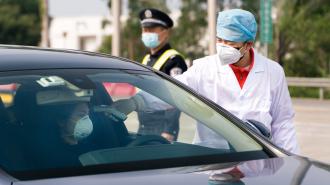Employees at a Seattle-area hospital are now getting tested at the United States’ first drive-thru coronavirus clinic — a novel approach to testing that minimizes the chances of spreading the respiratory illness.
How the Drive-Thru Coronavirus Clinic Works
Washington state is currently home to more COVID-19 cases than anywhere else in the U.S. That makes the 30,000 employees of the University of Washington Medicine system key players in the nation’s efforts to contain the coronavirus outbreak.
To that end, UW Medicine is now asking any staff members who start to experience a fever or other symptoms of COVID-19 to fill out an online health survey. Those suspected of having the disease are then given an appointment to visit the system’s newly opened drive-thru coronavirus clinic.
There’s less face-to-face contact. If you operate a site indoors, patients can infect each other.
Lee Jae-joon
When they arrive at the clinic, the patient drives up to one of three white tents set up in a garage lot outside UW Medical Center Northwest.
There, a nurse in full protective gear takes swabs of their nose through the car’s rolled-down window. The nurse seals the swabs in a plastic tube so that they can be sent to a lab a few miles away to see if they test positive for COVID-19, influenza, or RSV.
The nurse then changes into fresh protective gear before testing the next patient.
The outdoor setup feels like a makeshift solution, but the site was chosen deliberately to permit maximum airflow and ventilation. Because the disease can be spread through coughing, allowing the breeze to dissipate droplets hanging in the air will dramatically reduce the risk to nurses and other patients. And because patients don’t touch anything, there’s no chairs, doorknobs, or other equipment to sterilize.
The Seattle drive-thru coronavirus clinic plans to expand testing to include first-responders at high-risk of COVID-19 exposure, officials told NPR, but for now, it is focusing only on the medical system’s staff members.
“We want to make sure that if our staff test negative we get them back to work as soon as we can,” Seth Cohen, head of UW Medical Center Northwest’s Infectious Disease Clinic, told the news outlet. “But if they test positive we want to keep them out of the workforce to make sure they’re not going on to infect other staff or patients.”
Following South Korea’s COVID-19 Lead
Seattle’s drive-thru coronavirus clinic is the first in the U.S., but not in the world.
The novel approach to testing was developed by health officials in South Korea, which is currently the nation with the most cases of COVID-19 after China and Italy. They opened the first of the clinics in Goyang, Gyeonggi Province, on February 26, and now, there are stations set up in at least three South Korean districts.
Park Hyun-su, a local communications official, told The Korea Herald the whole testing process at the Goyang drive-thru coronavirus clinic takes just 10 minutes.
That’s 20 minutes faster than what a patient could expect at a hospital or traditional clinic, and it also minimizes a person’s chances of catching COVID-19 if they don’t already have it.
“There’s less face-to-face contact,” Goyang Mayor Lee Jae-joon told CNN. “If you operate a testing site indoors, there is concern that suspected patients can infect each other in the waiting room.”
Containing the Coronavirus Outbreak
Since South Korea opened its first drive-thru coronavirus clinic, the United Kingdom has opened several of its own, and Australia is now considering following suit.
That’s not surprising given that South Korea’s approach to containing the coronavirus outbreak seems to be working.
The number of daily infections in the nation is now on the decline, and on March 9, health minister Park Neunghoo told CNN the country is “cautiously expecting” it has passed the peak of the outbreak.
Key to those containment efforts, according to Park, has been South Korea’s commitment to making testing widely available to anyone suspected of having COVID-19. At the time he spoke to CNN, the nation had conducted 196,000 tests at no cost to patients.
“Detecting patients at an early stage is very important and we learned the simple lessons by dealing with this virus that this is very contagious — and once it starts, it spreads very quickly and in very wide areas,” Park said. “Raising the testing capability is very important because that way, you can detect someone who’s carrying the virus, then you can contain the virus.”






